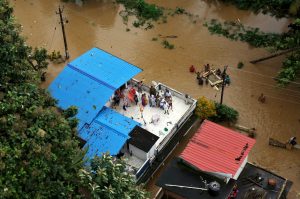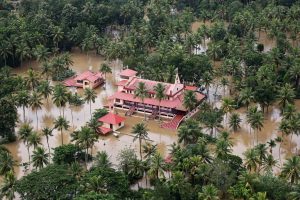
By Sivaram Venkitasubramanian and Gopakumar Warrier
KOCHI/BENGALURU, India (Reuters) – The worst floods in a century in the Indian state of Kerala have killed 164 people and forced more than 200,000 into relief camps, officials said on Friday, with more misery expected as heavy rain pushed water levels higher.
Prime Minister Narendra Modi is due to visit the southwest state later on Friday and its chief minister said he was hoping the military could step up help for the rescue effort, which is already using dozens of helicopters and hundreds of boats.
“I spoke to the defense minister this morning and asked for more helicopters,” Chief Minister Pinarayi Vijayan told a news conference in the state capital, Thiruvananthapuram, adding that he planned to send 11 more helicopters to the worst-hit places.
“In some areas, airlifting is the only option … thousands are still marooned,” said Vijayan.
The floods began nine days ago and Vijayan said 164 people had been killed – some in landslides – with about 223,000 people forced into 1,568 relief camps.
A Reuters witness on board a relief helicopter in Chengannur town in the south of the state said people stranded on roof tops were seen waving desperately at navy aircraft.
“The town looked like an island dotted with houses and cars submerged in muddy flood waters and downed coconut trees,” said the witness.

People wait for aid on the roof of their house at a flooded area in the southern state of Kerala, India, August 17, 2018. REUTERS/Sivaram V
Two navy helicopters circled as people on roofs of flooded homes waved clothing to call for help.
The helicopters dropped food and water in metal baskets and airlifted at least four people, including a three-year-old child, from roofs, the witness said.
Elsewhere, a man with a cast on his leg was seen lying on the roof of a church as he awaited rescue.
Anil Vasudevan, the head of the Kerala health disaster response wing, said his department had geared up to handle the needs of victims.
“We’ve deployed adequate doctors and staff and provided all essential medicines in the relief camps, where the evacuees will be housed,” he said.
But a big worry was what happens after the flood waters fall. People going home will be susceptible to water-borne diseases, he said.
“We are making elaborate arrangements to deal with that,” he said.
PLANES, TRAINS DISRUPTED
Kerala is a major destination for both domestic and foreign tourists.
The airport in its main commercial city of Kochi has been flooded it has suspended operations until Aug. 26 with flights being diverted to two other airports in the state. Rail and road traffic has also been disrupted in many places.
“Water levels continue to overflow on track and surpassing danger level of bridges at different places,” Southern Railway said in a statement, adding it had canceled more than a dozen trains passing through Kerala.
The office of the chief minister said heavy rain was falling in some places on Friday. More showers are expected over the weekend.
Modi said on Twitter that he would travel to Kerala “to take stock of the unfortunate situation”.

An aerial view shows partially submerged houses at a flooded area in the southern state of Kerala, India, August 17, 2018. REUTERS/Sivaram V
Kerala has been hit with 37 percent more rainfall than normal since the beginning of this monsoon, the Meteorological Department said.
Some plantations have also been inundated. The state is a major producer of rubber, tea, coffee and spices such as black pepper and cardamom.
“It’s very scary. I can still see people on their roofs waiting to be rescued,” said George Valy, a rubber dealer in Kottayam town.
(Reporting by Sivaram Venkitasubramanian in Kochi and Gopakumar Warrier in Bengaluru; Additional reporting by Jose Devasia in Kochi and Swati Bhat and Rajendra Jadhav in Mumbai; Writing by Euan Rocha and Sankalp Phartiyal; Editing by Robert Birsel)